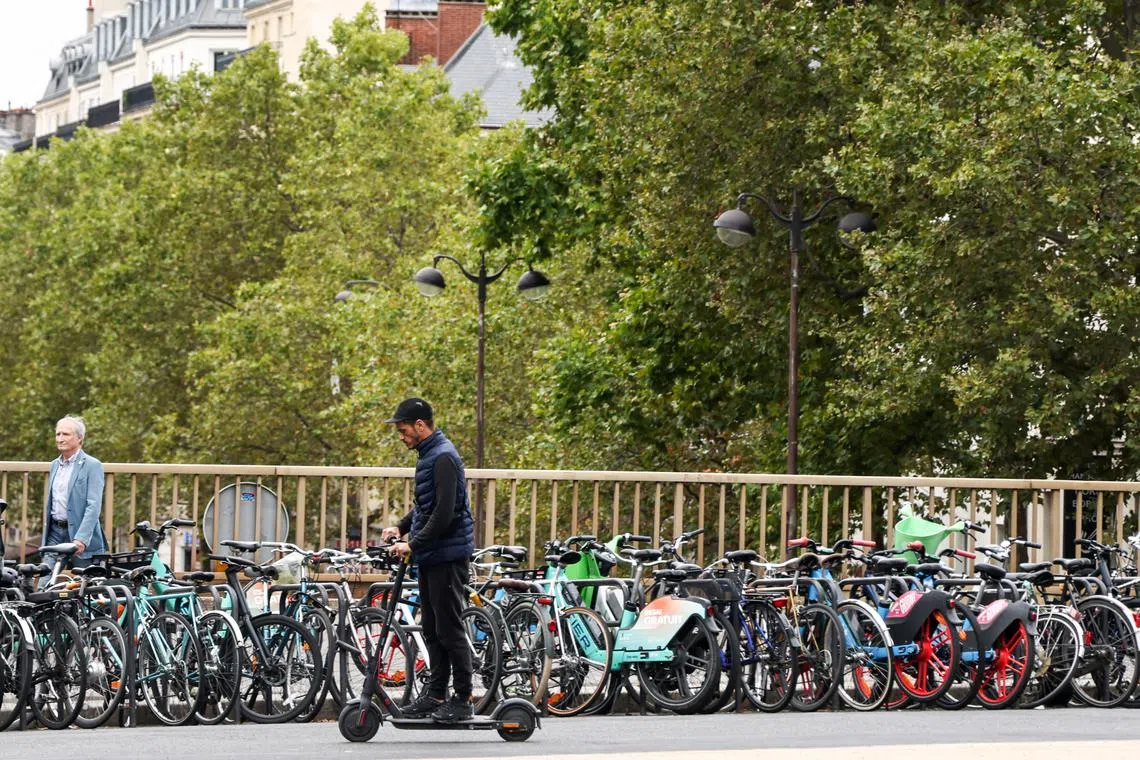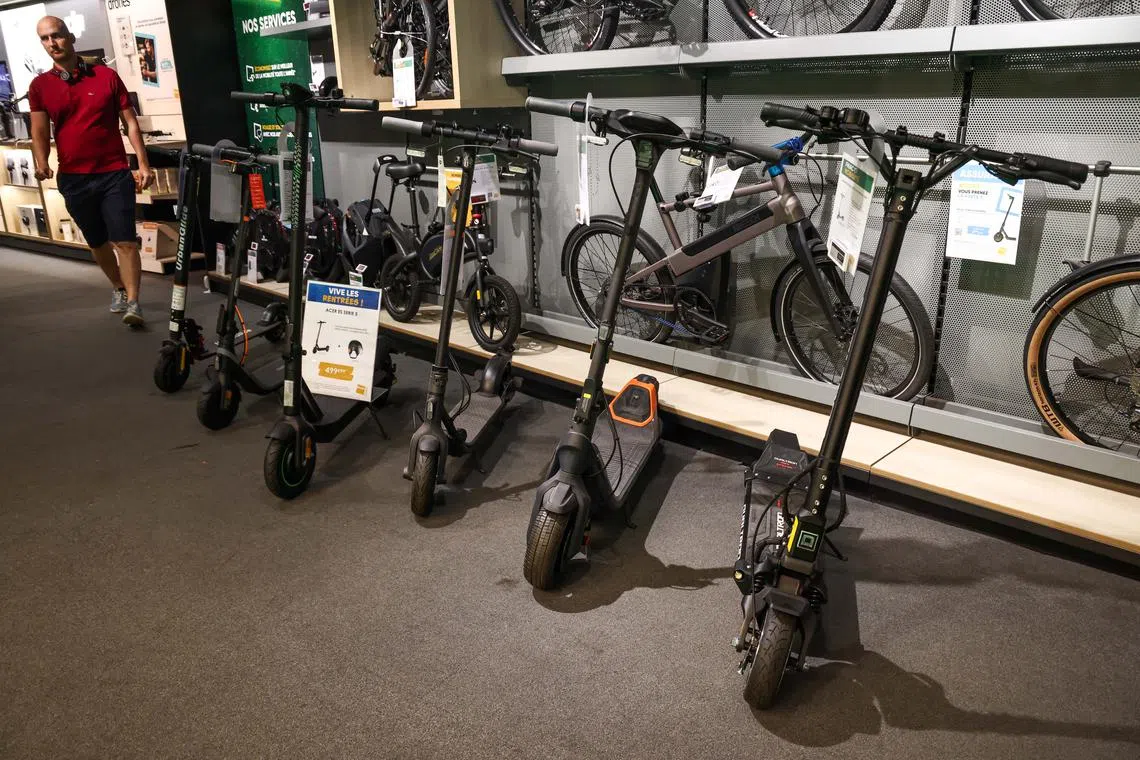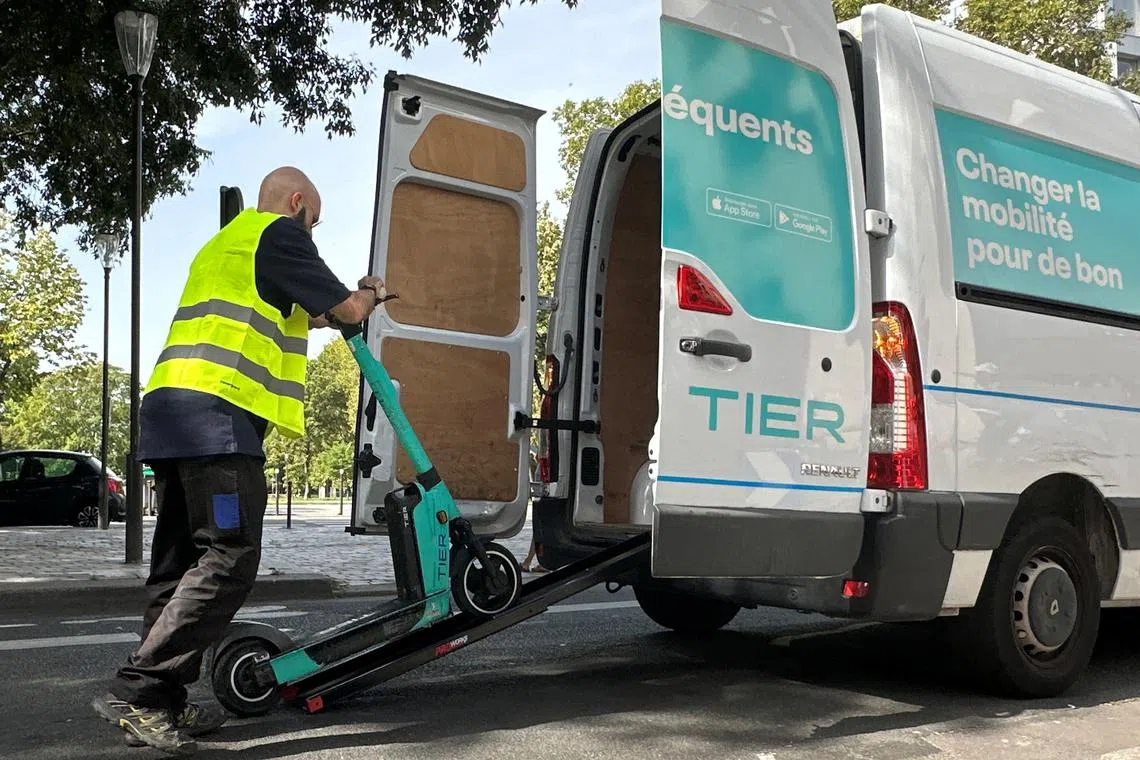Paris becomes first European capital to ban rented electric scooters
Sign up now: Get ST's newsletters delivered to your inbox

Paris became the first European capital to outlaw the vehicles on Friday, following a vote in April.
PHOTO: EPA-EFE
Follow topic:
PARIS – As Paris’ experiment with e-scooters came to an end on Friday, Ms Anne-Marie Moreno set out on her morning walk feeling just a little more peaceful.
Ms Moreno, a 78-year-old retiree who was knocked over by a man riding an electric scooter a few years back, was luxuriating in the calm of her neighbourhood.
She did not come across a single person on an e-scooter.
Paris became the first European capital to outlaw the vehicles on Friday, following a vote in April in which Parisians overwhelmingly supported a ban,
“I’m always scared when I see one,” Ms Moreno said.
“I got off with just a scratch when I was knocked over, but I’m scared that the next time I fall, I’ll crack my head in two.”
Her husband nodded next to her as cars, mopeds and bikes zoomed past a busy intersection at the Place du General Leclerc in southern Paris.
Since their eruption onto the streets and sidewalks of cities across the world in 2019, e-scooters have posed unique regulatory problems for city officials.
The vehicles often stayed in legal limbo as officials mapped out charters for e-scooter operators, capped fleets and regulated parking.
Cities like San Francisco and Miami temporarily banned e-scooters before reintroducing them. Santa Monica, California, successfully sued an e-scooter operator over its lack of licensing. And New York delayed the vehicles’ arrival, citing security concerns.
But no city has been as strict as Paris, where e-scooter users are mourning a cheap and flexible way of getting round without having to ride the crammed metro or use Velib, the popular but frequently overwhelmed bike-sharing system.
Late-night workers, in particular, said they would miss them.

Since their eruption onto the streets and sidewalks of cities across the world in 2019, e-scooters have posed unique regulatory problems for city officials.
PHOTO: EPA-EFE
On Friday morning, Mr Abbas Hamy, 36, was neatly aligning falafels on the rim of an open-air fryer in his Lebanese sandwich shop.
He was not aware of the ban.
“So this means that if I finish work at 2am, I can’t take an e-scooter home?” he asked.
He said he liked how fast his ride home was on an e-scooter in the middle of the night. Empty streets meant he could make it home in minutes, despite living about 6km from his workplace.
He said he had never seen the scooters cause any problem on the street where he works, the Rue Mouffetard, one of the most popular places for street food in Paris. But he understood the security concerns.
E-scooters, whether rented or personally owned, were involved in three fatal accidents in 2022, with 459 people being injured in e-scooter accidents, according to the Paris police headquarters.
But France’s largest risk-prevention association, Prevention Routiere, said it would have preferred that the city concentrate on helmet use and the regulation of rides at night, when most accidents happen, rather than a ban.
“Banning shared e-scooters won’t change the way people behave,” said Ms Anne Lavaud, the leader of Prevention Routiere.
The city of Paris said it would open almost 40km more of bike lanes in 2023, and e-scooter operators have bolstered their e-bike fleets in recent months in anticipation of the ban. They said they would redeploy their e-scooters in cities where fleets are expanding, in France or abroad.
“Since Paris voted to ban e-scooters, we’ve won permits or had permits renewed in London, Rome and Madrid,” said Mr Nicolas Gorse, the general director of Dott, one of three e-scooter operators in Paris.
“The ban is not endangering our business model.”

An employee removes an electric scooter by Tier sharing service from a street in Paris as an e-scooter ban is set to take effect in France, on Aug 23.
PHOTO: REUTERS
As Paris was banning e-scooters, European cities of comparable size, like Berlin, threw their weight behind the devices.
Berlin has five scooter operators and 40,000 registered e-scooters zooming across the city. “There’s always more,” the Berliner Zeitung, a local news outlet, recently commented.
Lime, the largest scooter operator in Paris, said it would not fire anyone as a result of the ban.
But Dott, the second-largest operator, said it planned to fire 50 of its full-time workers and 50 of the seasonal workers it usually recruits when demand soars in summer.
Dott said it would try to offer its workers jobs in French cities like Lille, where operations are expanding. “It is a painful process,” Mr Gorse said.
But he added he was relieved that the City Hall and his company now shared a single objective.
“Everyone agrees on ramping up the bike service, especially with the Paris Olympics next summer,” he said. NYTIMES

